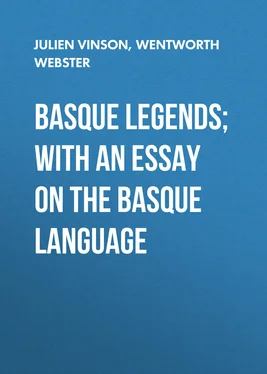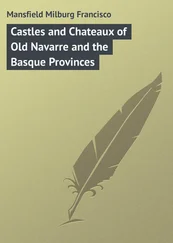Julien Vinson - Basque Legends; With an Essay on the Basque Language
Здесь есть возможность читать онлайн «Julien Vinson - Basque Legends; With an Essay on the Basque Language» — ознакомительный отрывок электронной книги совершенно бесплатно, а после прочтения отрывка купить полную версию. В некоторых случаях можно слушать аудио, скачать через торрент в формате fb2 и присутствует краткое содержание. Жанр: foreign_antique, Старинная литература, Мифы. Легенды. Эпос, на английском языке. Описание произведения, (предисловие) а так же отзывы посетителей доступны на портале библиотеки ЛибКат.
- Название:Basque Legends; With an Essay on the Basque Language
- Автор:
- Жанр:
- Год:неизвестен
- ISBN:нет данных
- Рейтинг книги:3 / 5. Голосов: 1
-
Избранное:Добавить в избранное
- Отзывы:
-
Ваша оценка:
- 60
- 1
- 2
- 3
- 4
- 5
Basque Legends; With an Essay on the Basque Language: краткое содержание, описание и аннотация
Предлагаем к чтению аннотацию, описание, краткое содержание или предисловие (зависит от того, что написал сам автор книги «Basque Legends; With an Essay on the Basque Language»). Если вы не нашли необходимую информацию о книге — напишите в комментариях, мы постараемся отыскать её.
Basque Legends; With an Essay on the Basque Language — читать онлайн ознакомительный отрывок
Ниже представлен текст книги, разбитый по страницам. Система сохранения места последней прочитанной страницы, позволяет с удобством читать онлайн бесплатно книгу «Basque Legends; With an Essay on the Basque Language», без необходимости каждый раз заново искать на чём Вы остановились. Поставьте закладку, и сможете в любой момент перейти на страницу, на которой закончили чтение.
Интервал:
Закладка:
Our man goes off happy. He leads a merry life with his wife, for they wanted for nothing. They lived at a great rate. But time went on, and the time was approaching. This man recollected that he had not busied himself at all about the devil’s age. He became pensive. His wife asked him what was the matter with him then? why is he not happy? that they wanted for nothing; why is he so sad? He tells her how it is that he got rich, and what compact he had made with a gentleman. His wife said to him:
“If you have nothing but that, it is nothing at all. Get into a barrel of honey, and when you come out of it get into another barrel of feathers, and dressed like that go to the cross-roads and wait for the devil there. You will put yourself on all fours, and walk backwards and forwards, and go between his legs, and walk all round him.”
The man does as his wife had told him. The devil comes, and draws back (when he sees him); and our man goes up quite close to the devil. The devil being frightened said to him:
“I am so many years old, and I have never seen any animal like that, and such a frightful one.” 56 56 Cf. “The Brewery of Egg-shells,” in Croker’s “Fairy Legends of the South of Ireland,” pp. 32–36.
Our man had heard enough. He went off home at full speed, and told his wife that they would want for nothing, that he had done as she had told him, just as if she had been a witch, and that he was no longer afraid of the devil. They lived rich and happily, and if they lived well, they died well too.
Franchun Beltzarri.
The Fairy-Queen Godmother. 57 57 This tale, or at least this version of it, with the names Rose and Bellarose, must come from the French.
There were, like many others in the world, a man and a woman over-burthened with children, and very poor. The woman no more knew what to do. She said that she would go and beg. She goes off, far, far, far away, and she arrives at the city of the fairies. After she had told them how many children she had, all give her a great many alms—she was laden with them.
The queen of the fairies gives her besides twenty pounds in gold, and says to her:
“If you will give me your child when you are confined—you shall bring it up in your law—I will give you a great deal of money, if you will do that.”
She told her that the godmother was already decided upon, but that she would speak about it to her husband. The queen told her to go home, and to return with the answer in a week.
She gets home as she best can, very much fatigued by her burthen. Her husband was astonished that she could have carried so much. She tells him what had happened with the queen of the fairies. He says to her:
“Certainly, we will make her godmother.”
And she returns at the end of a week to tell the queen that she accepts her. She tells her not to send and tell her when she is confined, that she will know it herself, and that she will come all right. At the end of a week she is confined of a daughter. The queen arrives, as she had said, with a mule laden with gold. When they came back from the christening, the godmother and the child fly away; and the parents console themselves with their other children, thinking that she will be happier in the house of the queen of the fairies.
The queen takes her to a corner of a mountain. It is there where her house was. She had already another god-daughter; this was a little dog, whose name was Rose, 58 58 “A little dog” is mentioned in Campbell’s “The Daughter of the Skies,” Vol. I., 202, and notes.
and she named this last god-daughter Pretty-Rose. She gave her, too, a glint of diamonds in the middle of her forehead. 59 59 ”Kopetaen erdian diamanteko bista batez”—“a view of diamonds in the middle of the forehead.”
She was very pretty. She grew up in the corner of the mountain, amusing herself with this dog. She said to her one day:
“Has the queen no other houses? I am tired of being always here.”
The dog said to her: “Yes, she has a very fine one by the side of the king’s highway, and I will speak to my godmamma about it.”
And the dog then told her how Pretty-Rose was bored, and (asked her) if she would not change her house. She said to her, “Yes,” and off they go. While they were there one day Pretty-Rose was on the balcony, and a king’s son passes, and he was astonished at the beauty of Pretty-Rose; and the king begged and prayed her to look at him again, and (asked her) if she would not go with him. She told him, “No, that she must tell it to her godmamma.” Then the dog said, aside:
“No, without me she shall not go anywhere.”
This king says to her: “But I will take you, too, willingly; but how shall I get you?”
Rose says to him: “As I give every evening to my godmother always a glass of good liqueur to make her sleep well, as if by mistake, instead of half a glass, I will give her the glass full, and as she will not be able to rise any more to shut the door as usual, I, I will go and take the key to shut it. I will pretend to, and will give her back the key, leaving the door open, and you will open it when you come. She will not hear anything; she will be in a deep sleep.”
The king’s son said that he would come at midnight, in his flying chariot.
When night came, Rose gave her godmother the good drink in a glass, brim, brim-full. The godmother said:
“What! what! child!”
“You will sleep all the better, godmamma.”
“You are right,” and she drinks it all.
But she could not any more get up to shut the door, she had become so sleepy.
Rose said to her: “Godmamma! I will shut the door to-day; stop where you are.”
She gave her the key, and Rose turns and turns it back again and again in the keyhole as if she had locked it; and leaving it unlocked she gave the key to her godmother, and she puts it in her pocket. She goes to bed; but Rose and Pretty-Rose did not go to bed at all. At midnight the son of the king arrives with his flying chariot. Rose and Pretty-Rose get into it, and go to this young man’s house. The next day Rose says to Pretty-Rose:
“You are not so pretty as you were yesterday;” and looking at her closely, “I find you very ugly to-day.”
Pretty-Rose said to her: “My godmamma must have taken away my diamond glint.”
And she said to Rose, “You must go to my godmamma, and ask her to give me back the glint that I had before.”
Rose did not want to go there—she was afraid; but Pretty-Rose prayed her so much, that she took off the silver dress and set out. 60 60 Nothing has been said about this dress before. Something must have dropped out of the story.
When she came to the mountain, she began to call out:
“Godmamma! godmamma! Give Pretty-Rose her beautiful glint as before. I shall be angry with you for always (if you do not), and you will see what will happen to you.”
The godmother said to her:
“Come here, come in, I will give you breakfast.”
She said, “I am afraid you will beat me.”
“No! no! come quickly, then.”
“You will give Pretty-Rose her glint?”
“Yes, yes, she has it already.”
She then goes in. The queen washes her feet and wipes them, and puts her upon the velvet cushion, and gives her some chocolate; and says to her, that she knows where Pretty-Rose is, and that she will be married, and to tell her from her not to trouble herself about her toilet, nor about anything that is necessary for the wedding and feast, that she would come on the morning of the day.
Rose goes off then. While she is going through the city where Pretty-Rose is, she hears two ladies, who were saying to two gentlemen, “What kind of wife is it that our brother is going to take? Not like us, because he keeps her shut up so close. Let us go and see her.”
Читать дальшеИнтервал:
Закладка:
Похожие книги на «Basque Legends; With an Essay on the Basque Language»
Представляем Вашему вниманию похожие книги на «Basque Legends; With an Essay on the Basque Language» списком для выбора. Мы отобрали схожую по названию и смыслу литературу в надежде предоставить читателям больше вариантов отыскать новые, интересные, ещё непрочитанные произведения.
Обсуждение, отзывы о книге «Basque Legends; With an Essay on the Basque Language» и просто собственные мнения читателей. Оставьте ваши комментарии, напишите, что Вы думаете о произведении, его смысле или главных героях. Укажите что конкретно понравилось, а что нет, и почему Вы так считаете.












